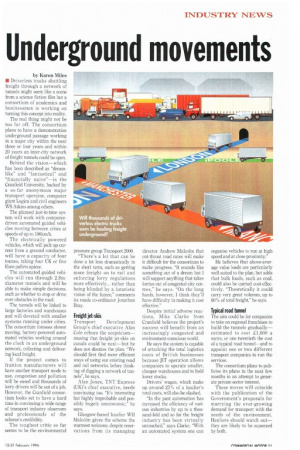Underground
Page 13

If you've noticed an error in this article please click here to report it so we can fix it.
by Karen Miles • Driverless trucks shuttling freight through a network of tunnels might seem like a scene from a science fiction film but a consortium of academics and businessmen is working on turning this concept into reality.
The real thing might not be too far off. The consortium plans to have a demonstration underground passage working in a major city within the next three or four years and within 20 years an inter-city network of freight tunnels could be open.
Behind the vision—which has been described as "dreamlike" and "fantastical" and "financially naive"—is the Cranfield University, backed by a so-far anonymous major transport operator, computer giant Logica and civil engineers WS Atkins among others.
The planned just-in-time system will work with computerdriven automated guided vehicles moving between cities at speeds of up to 100km/h.
The electrically powered vehicles, which will pick up current from a ground conductor, will have a capacity of four tonnes, taking four UK or five Euro pallets apiece.
The automated guided vehicles will run through 2.8mdiameter tunnels and will be able to make simple decisions, such as whether to stop or drive over obstacles in the road.
The tunnels will be linked to large factories and warehouses and will dovetail with smaller systems running under cities. The consortium foresees slower moving, battery-powered automated vehicles working around the clock in an underground network, collecting and delivering local freight.
If the project comes to fruition manufacturers will have another transport mode to use, congestion and pollution will be eased and thousands of lorry drivers will be out of a job. However, the Cranfield consortium looks set to have a hard time in convincing a wide range of transport industry observers and professionals of the scheme's credibility.
The toughest critic so far seems to be the environmental pressure group Transport 2000.
"There's a lot that can be done a lot less dramatically in the short term, such as getting more freight on to rail and enforcing lorry regulations more effectively.., rather than being blinded by a futuristic vision of the future," comments its roads co-ordinator Jonathan Bray.
Transport Development Group's chief executive Alan Cole echoes the scepticism— musing that freight jet-skis on canals could be next—but he does not dismiss the plan. "We should first find more efficient ways of using our existing road and rail networks before thinking of digging a network of tunnels", he says.
Alan Jones, TNT Express (UK)'s chief executive, needs convincing too. "It's interesting but highly improbable and possibly hugely uneconomic," he says.
Glasgow-based haulier WH Malcolm gives the scheme the warmest welcome, despite reservations from its managing director Andrew Malcolm that cut-throat road rates will make it difficult for the consortium to make progress. "It sounds like something out of a dream but I will support anything that takes lorries out of congested city centres," he says. "On the long hauls, however, I think they'll have difficulty in making it cost effective."
Despite initial adverse reac tions, Mike Clarke from Cranfield believes the project's success will benefit from an increasingly congested and environment-conscious world.
He says the system is capable of attacking the total logistics costs of British businesses because JIT operation allows companies to operate smaller, cheaper warehouses and to hold lower stocks.
Drivers' wages, which make up around 25% of a haulier's total costs, will also be slashed.
"In the past automation has increased the efficiency of various industries by up to a thousand-fold and so far the freight industry has been virtually untouched," says Clarke. "With an automated system one can organise vehicles to run at high speed and at close proximity."
He believes that above-average value loads are particularly well suited to the plan, but adds that bulk loads, such as coal, could also be carried cost-effectively. "Theoretically it could carry very great volumes, up to 80% of total freight," he says.
The aim could be for companies to take on regional franchises to build the tunnels gradually— estimated to cost £1,000 a metre, or one twentieth the cost of a typical road tunnel—and to appoint one or two different transport companies to run the services.
The consortium plans to publicise its plans in the next few months in an attempt to generate private sector interest.
These moves will coincide with the publication of the Government's proposals for marrying the ever-growing demand for transport with the needs of the environment. Hauliers should watch out— they are likely to be squeezed by both.




















































































































